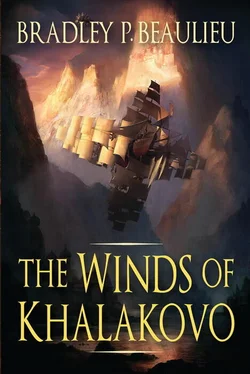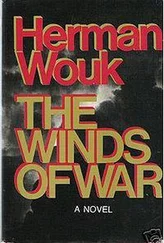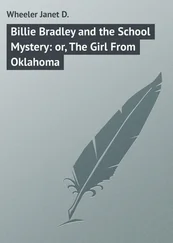Bradley Beaulieu - The Winds of Khalakovo
Здесь есть возможность читать онлайн «Bradley Beaulieu - The Winds of Khalakovo» весь текст электронной книги совершенно бесплатно (целиком полную версию без сокращений). В некоторых случаях можно слушать аудио, скачать через торрент в формате fb2 и присутствует краткое содержание. Жанр: Фэнтези, на английском языке. Описание произведения, (предисловие) а так же отзывы посетителей доступны на портале библиотеки ЛибКат.
- Название:The Winds of Khalakovo
- Автор:
- Жанр:
- Год:неизвестен
- ISBN:нет данных
- Рейтинг книги:4 / 5. Голосов: 1
-
Избранное:Добавить в избранное
- Отзывы:
-
Ваша оценка:
- 80
- 1
- 2
- 3
- 4
- 5
The Winds of Khalakovo: краткое содержание, описание и аннотация
Предлагаем к чтению аннотацию, описание, краткое содержание или предисловие (зависит от того, что написал сам автор книги «The Winds of Khalakovo»). Если вы не нашли необходимую информацию о книге — напишите в комментариях, мы постараемся отыскать её.
The Winds of Khalakovo — читать онлайн бесплатно полную книгу (весь текст) целиком
Ниже представлен текст книги, разбитый по страницам. Система сохранения места последней прочитанной страницы, позволяет с удобством читать онлайн бесплатно книгу «The Winds of Khalakovo», без необходимости каждый раз заново искать на чём Вы остановились. Поставьте закладку, и сможете в любой момент перейти на страницу, на которой закончили чтение.
Интервал:
Закладка:
As they continued their way around the circle, Nikandr noticed a woman wearing black robes of mourning. She was a good distance away, and the wind was throwing the snow about, but he was sure it was Rehada. She seemed to notice him as well, for she immediately turned and strode down the nearest street and was lost from view moments later.
Had Borund’s presence made her act that way? They had agreed not to advertise their relationship, but in the instant their eyes had met she hadn’t seemed worried. She had seemed ashamed.
“How much longer?” Borund said irritably.
Nikandr glanced over, wondering if he’d seen. “If I didn’t know better, I’d say you could no longer stand the cold, Bora.”
“I can”-Borund sniffed-“when necessary.”
“You were the one who insisted on joining me.”Nikandr guided his pony onto a wide street that hugged the River Mordova on its final stretch toward the bay. As they passed a small graveyard, where chips of chalcedony marked the myriad of gravestones, the smell of the sea grew stronger.
Borund’s frown deepened the creases on his brow, but beneath his bushy eyebrows his eyes twinkled. “That was when I thought we were visiting the shipyard. Had I known he was buried among the wharfs, I might not have been so hasty.”
“Well, we’re nearly there now.” Nikandr nodded ahead, where the river emptied into the bay and the street turned onto the long, curving quay.
A large fishing ship was pulling in to berth-probably the first of the day. A sizable crowd was pressing in around it. He wondered if his brother in the Boyar’s house knew how bad it was getting down here.
From a large boulevard several hundred yards further up, ten streltsi leading a large black wagon turned onto the quay and marched toward the ship. The soldiers wore fur hats and thick black cherkesskas buttoned high up their necks. Their muskets were slung over one shoulder while their tall berdische axes were held in readied hands. The desyatnik of the streltsi-a man whose hat was gray instead of black-shouted at the crowd, demanding room for the palotza. The wagon carried a handful of workmen in Radiskoye’s livery and was adorned with the Khalakovo family seal: a sailfish arcing high above a turbulent sea. It pulled wide and then arced around until its rear was even with the gangway of the fishing ship.
The crowd made way for the streltsi and the wagon, but did so grudgingly. Many would go away hungry, Nikandr knew. There simply wasn’t enough to go around. The fishing beds that had been so reliable in years past had gone dry; add to that the pitiful yield the crops were looking to have and one could easily predict outright famine this year.
Nikandr and Borund stopped short of the crowd and tied their ponies near a ramp leading up to the doors of an immense workshop. An ancient figurehead of a man gripping a hammer in one hand and a large pearl in the other hung above the doors, one of which was propped open. They found Gravlos within, walking alongside a fresh spar, a curl of wood falling free from the plane he was using to smooth the rounded but still-raw shape of it. His wooden leg thumped softly as he went. When he realized someone was standing in his doorway he stood and wiped his brow with the sleeve of his forearm. His face was severe, but he managed a kindly smile when he recognized them.
“Lose your way?” He set his plane on a nearby worktable, winking as he did so.
Nikandr’s entire body tightened as something splashed to his left. Borund backed up as well, staring at a large tun that stood just inside the workshop doors. It was as tall as Nikandr’s chest and was filled nearly to the top with water. Nikandr approached, but it was with a sickly sense of dread, like when he’d played find-me-if-you-can as a child late at night with Ranos and Victania in the dark and mysterious halls of Radiskoye. When he finally came close enough to look down into it, he saw something folded over, as if a random bolt of weathered canvas had been tossed into the tun and then forgotten. The canvas rippled, and Nikandr saw what looked to be a jaundiced eye.
“I bought it from a fisherman this morning.” Gravlos picked up a stick that had been resting against the door and poked the thing. It rippled again, and an enormous jaw unfolded itself, revealing a triple row of thorn-sharp teeth. A thin tongue whiter than fresh-fallen snow slithered out and glowed momentarily.
Nikandr laughed from the sheer horror of the thing.
“The old sailors call them tarpfish,” Gravlos continued. “It was caught off the coast of Duzol, only three leagues out to sea.”
“Excluding Nikandr,” Borund said with a distinct note of awe, “that is the ugliest thing I’ve ever seen.”
Gravlos began poking the fish again. “Wait, it gets worse.”
Only a moment later, the fish belched out a stream of shit-colored ink and began flapping around the tun. Water sprayed everywhere. All three men backed away, laughing and holding their sleeves against the fierce smell of rotted cabbage.
Nikandr couldn’t help but think of the wasting, of the rot that was growing within him, but to laugh with Borund felt good. It felt like the days of old, and he wasn’t about to feel sorry for himself at a time like this.
Borund pointed at it, still laughing. “What in the wide great seas made you buy such a thing?”
Gravlos nodded toward Nikandr. “You’ve not heard?”
Borund looked between Nikandr and Gravlos. “Heard what?”
Gravlos caught Nikandr’s eye, waiting for permission. When Nikandr nodded, he said, “I thought My Lord Prince would want to see it. He’s been flying around the islands, every spare moment he’s had outside of our work on the Gorovna, searching for clues.”
“Clues to what?”
“To the blight,” Nikandr answered.
Borund chuckled, but stopped when he realized Nikandr was serious. “We should have asked for more ships if you have so many to go about.”
“Easy words for you, Bora. Vostroma has not been hit so hard as Khalakovo.”
“And Rhavanki is worse off than you.”
“But that’s all changing. Rhavanki’s hauls have been better. Their first plantings look to be healthier than years past.”
“This is my point, Nischka. Nature will do what it will. It matters not what attention you might pay to it.”
This was a thought that came to Nikandr every day, but he refused to believe it. “Did you know that when herds of goats become sick, we have found hordes of black fleas on them?”
“Not surprising with diseased animals.”
Nikandr shook his head. “When we take them in and wash them with vinegar, the goats become well again.”
Borund laughed. “You should have told us. We could have brought you a herd.”
“The potatoes,” Nikandr continued, “if we discover mold in the roots, we know which fields should go untended. I can tell you by looking at a pack of wolves which are infected and how many days it will be before the pack devours them. If I watch the coast of an island for a day, I can tell by the flights of the gulls which shoals will yield the most herring.”
“And by the time the ships get there, things will have changed.”
“That isn’t the point. We learn more all the time, and someday we hope to understand the blight. Perhaps the wasting as well.”
Borund’s expression turned to sadness. “Nischka, the news of your sister’s illness was tragic, but do you really think you can unlock the secrets of her disease?”
Let’s hope so, Nikandr thought. “I’ll never know unless I try.”
Borund shook his head. “The blight and the wasting are unpredictable workings of the world, and nothing you do will change that.”
Suddenly the sounds of a grumbling crowd grew, making it clear the business of unlading the haul had gotten underway. It also made it clear that it was a smaller catch than the crowd had been hoping for-with so many visiting Khalakovo for Council, the palotza would need the ship’s entire catch and most likely several more beyond it.
Читать дальшеИнтервал:
Закладка:
Похожие книги на «The Winds of Khalakovo»
Представляем Вашему вниманию похожие книги на «The Winds of Khalakovo» списком для выбора. Мы отобрали схожую по названию и смыслу литературу в надежде предоставить читателям больше вариантов отыскать новые, интересные, ещё непрочитанные произведения.
Обсуждение, отзывы о книге «The Winds of Khalakovo» и просто собственные мнения читателей. Оставьте ваши комментарии, напишите, что Вы думаете о произведении, его смысле или главных героях. Укажите что конкретно понравилось, а что нет, и почему Вы так считаете.












